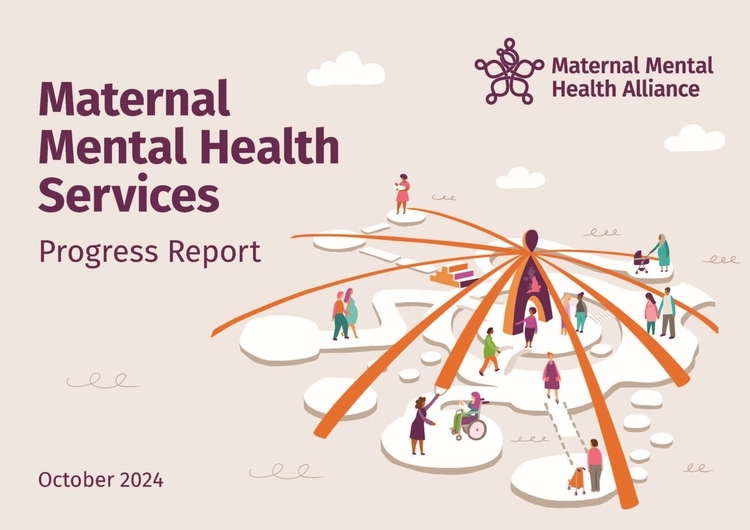Posted By: Amy Tubb
2nd October 2024
4 minute read

The Maternal Mental Health Alliance has released new research into the current landscape of Maternal Mental Health Services (MMHS) in England.
Based on survey responses from 41/46 MMHS, for the first time, this report offers a detailed look at how MMHS are being delivered at the local level. The report finds that there has been welcome progress with the establishment of these services in most areas of England, however it also highlights that many of these small services are struggling to cope with levels of demand.
The data shows wide variation between what care is provided for women, birthing people and their families, the criteria to access this care, and waiting times for assessment and treatment in different parts of the country. The inconsistencies uncovered suggest there are currently not enough resources to meet the need.
This is underlined by what healthcare professionals within these services are saying: “We have grown exponentially in terms of referrals since the launch of our service without additional investment in staffing. We are able to prove the value of our service... However, there are no local plans for more psychology to be able to offer specialist maternity-focussed therapy to more women because we are discouraged from operating a waiting list.”
Karen Middleton, Head of policy and campaigns at the Maternal Mental Health Alliance, says: “For women suffering birth trauma, baby loss and extreme fear of giving birth, the unique care that maternal mental health services offer can be life-changing. Whilst the increase in the number of MMHS is very welcome, these are very small and fragile services operating in a system which has historically underfunded both mental health and women’s health. Our survey found one service has already had to shut due to funding issues. Without further attention and investment, women will continue to face a postcode lottery to access this critical care.”
Positively, the MMHA found that 100% of MMHS are offering some level of support to women and birthing people who have experienced perinatal loss through miscarriage, stillbirth, neonatal death or termination for medical reasons. However, significant disparities remain as to what care is available in different parts of the country.
Dr Camilla Rosan, Chair of the Faculty of Perinatal Psychology at the British Psychological Society, says: "This mapping report highlights huge progress, but it also tells us that there is so much more to do. Women and birthing people are still left waiting for months and months, still jumping through hoops and leaping over mountains to get to the evidence-based care they need and deserve. All the while their symptoms are worsening. This is time they don’t have – parents and babies simply can’t wait..."
The most startling gap in care was for women and birthing people experiencing loss through care proceedings. The survey found that only 11 MMHS (27%) were supporting this high-risk group. Data also showed that many services are not recording whether the women they support come from groups more likely to face exclusion due to race or social issues. It is vital that these services measure this and are resourced to reach the most vulnerable groups, including those identified as facing higher risks of discrimination.
In order for MMHS to be help drive the change that is needed to improve equity of outcomes across maternity, the voices of women from all groups must be included in service design and their needs understood.
Maela, a mum with experience of baby loss, birth trauma and postnatal depression, says: “Lived experience needs to form a core part of that change from recruitment all the way down, we need to truly listen and act accordingly, a lot of lived experience consultants or coordinators would welcome the idea of working in partnership with our NHS to improve our maternal mental health.”
The Maternal Mental Health Alliance is calling on the government and NHS England to invest in the mental health of new and expectant mothers by expanding the resources available to MMHS. Currently, a woman’s postcode affects the care that she can access. Urgent action is needed to address disparities and ensure these small but vital MMHS can support all women, babies and families who need them, regardless of where they live.
Download the reportThe Maternal Mental Health Alliance (MMHA) is a coalition of 130 organisations dedicated to improving mental health care for women and families before, during pregnancy and after pregnancy. The MMHA works to ensure that all women and birthing people in the UK have access to high-quality, compassionate care for their mental health.